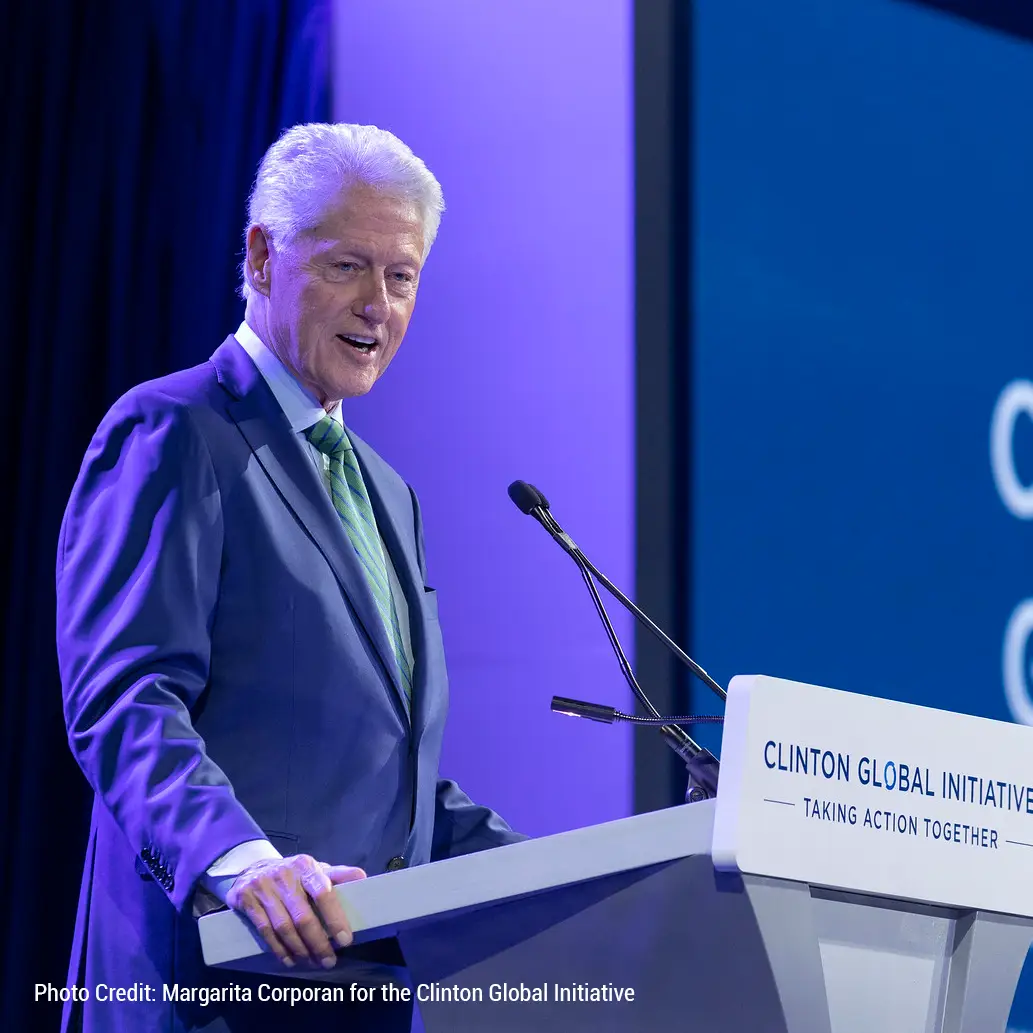Some use the moniker ‘Davos-on-Hudson’ to describe the Clinton Global Initiative – better known colloquially as ‘CGI’ by global movers and shakers. But no matter what name it goes by, historically, the annual gathering during UN Week in September has arguably been one of the hottest invites to come by on planet earth. Where else besides Davos can you rub elbows with U2’s Bono, heads of state, and the CEO of Unilever – all within the confines of a few thousand square feet in Midtown Manhattan?
CGI Field Report
This year I was fortunate to be invited to be part of this event chock-full of A-lister public sector leaders from across the globe, mega philanthropists, Fortune 500 business executives, cultural leaders, and media brass. (I guess I was part of the media brass.) Although the summit had been on hiatus since 2016, this year it came roaring back with broad theme of “The Business of How” – a two-day marathon of programming focused on how the business sector – major multinational corporations in particular –can step up to help solve the world’s most intractable problems, filling the gap where the public sector and philanthropy are coming up short.
In his call for leaders from business, government, and philanthropy to come together at CGI to take action, President Clinton wrote that he was expressing “…the urgency of the current moment in history, the need for creative cooperation.” The conference had a robust slate of sessions geared towards solving many of the planet’s most pressing problems, from climate change and health inequity to inclusive economic growth, gender equality and the growing international refugee crisis.
Imagine how much could be done if CGI were to engage Aldi, the German multinational family-owned discount supermarket chains with over 10,000 stores spanning 20 countries? Or Carrefour. Or CVS. Or H&M. Or Home Depot.
All in, this year’s CGI featured nearly 200 speakers spanning more than 30 sessions with bold-faced names like Queen Rania of Jordan, President Volodymyr Zelenskyy of Ukraine (via live remote), actor Matt Damon, and supermodel Christy Turlington Burns. On the philanthropy side, luminaries such as Melinda French Gates, the ex-wife of Bill Gates, Laurene Powell Jobs, the widow of Apple founder Steve Jobs, and Olivia Walton of the Walmart dynasty offered their takes on the status of global philanthropy and giving. Finally on the corporate point of view, attendees had a chance to hear from Blackrock CEO Larry Fink whose company manages over $10 trillion in assets, Jesper Brodin, the CEO of Ingka Group which owns Ikea, and André Esteves, the Chairman of BTG Pactual, the largest investment bank in Latin America, among many other top executives across a multitude of industries.
MIA
Know who we didn’t hear from? Retail executives. Aside from Ikea’s Brodin, and Kara Hurst who is the Vice President of Worldwide Sustainability for Amazon, the retail sector was curiously underrepresented at this year’s CGI. Even among non-presenting attendees, retail industry representation seemed to be scant. And I think that was a big miss on the part of the CGI organizers.
One thing that has always made CGI unique among the high-profile global confabs of this nature is its singular focus on “commitments.” Whether it’s donations or other detailed actions, all major participants are highly encouraged to share the specifics of how they or the organization they helm will be working towards solving the specific problems they are addressing. (Just to cite one example, at this year’s CGI, Melinda French Gates made a $50 million pledge to support a center of healthcare excellence located in rural Rwanda.) Overall, this public outing of “do-gooding” seems to work; to date, commitments made at CGI have created or funded programming that spans 80 countries, impacting over 400 million people across the globe.
Opportunity Knocks
And this is precisely why I think it was such a miss that the CGI organizers didn’t make a greater effort to bring in more senior leadership from Big Retail. Former President Clinton, former Secretary of State Hillary Clinton, and their daughter, Chelsea Clinton, certainly have the mojo to haul in names such as Doug McMillon, the CEO of Walmart or Brian Cornell who helms Target. Imagine if Target, which has publicly committed to investing $2 billion in Black-owned small businesses, announced at CGI that the company was offering free subscriptions to TurnSignl, the black-owned lawyer-on-demand app that assists drivers – especially women, people of color, and teenagers – navigate potentially fraught interactions with law enforcement to every member of Target Red Circle loyalty program? With 100 million Red Circle members, a free subscription to TurnSignl would end up saving countless lives of both drivers and police while deescalating countless otherwise tense roadside stops. Also, in one fell swoop, by leveraging the sheer volume of its loyalty program, Target would grow CGI’s global historical impact by as much as 25 percent. And that’s just Target.
Imagine how much could be done if CGI were to engage Aldi, the German multinational family-owned discount supermarket chains with over 10,000 stores spanning 20 countries? Or Carrefour. Or CVS. Or H&M. Or Home Depot. CGI’s current bragging rights of 400 million lives impacted could be completely obliterated in one year if the organization would pin their ears back and zero in on a full court press of Big Retail.
“We’re grateful for the chance to come back together. We still think cooperation beats conflict, and we’re going to have a good time trying to do it,” said President Clinton in his prepared remarks during the opening plenary. I couldn’t agree more. But next year make sure Big Retail is invited to the party. You can thank me later.





